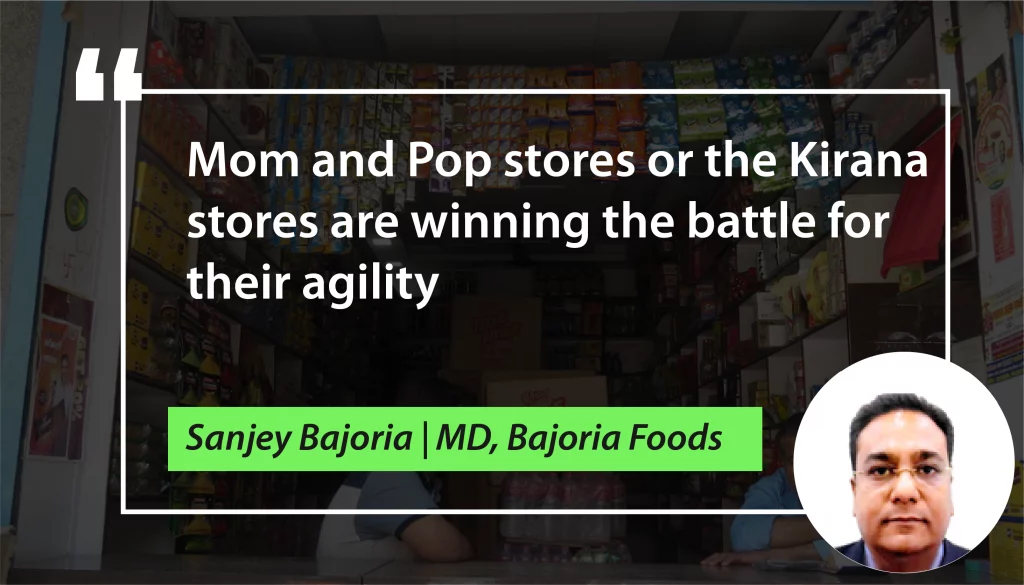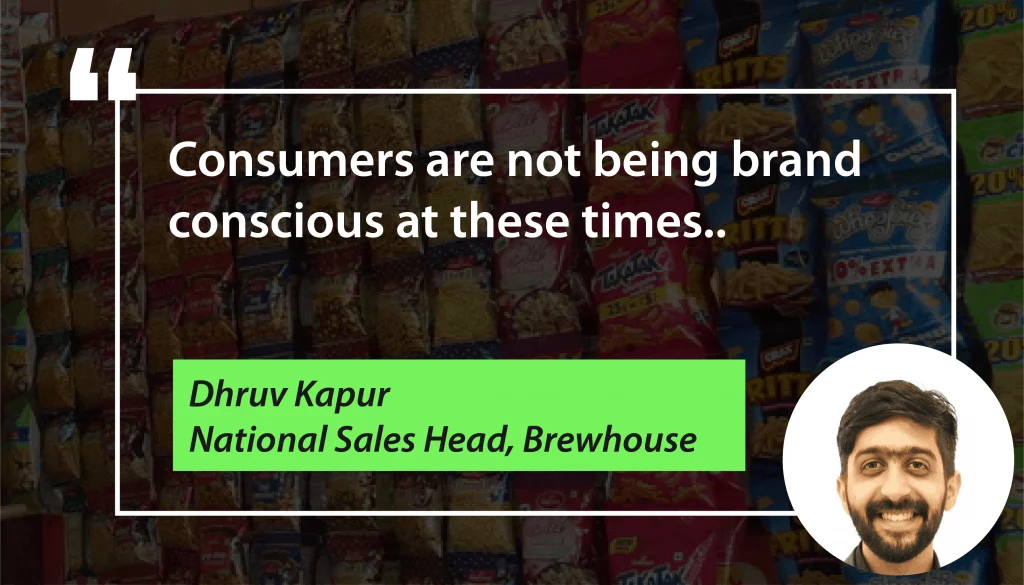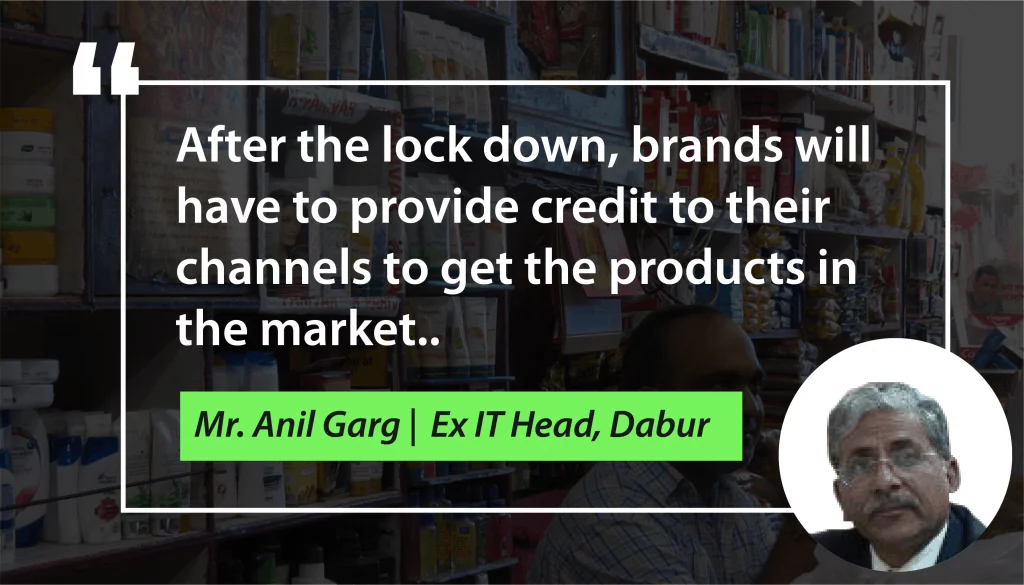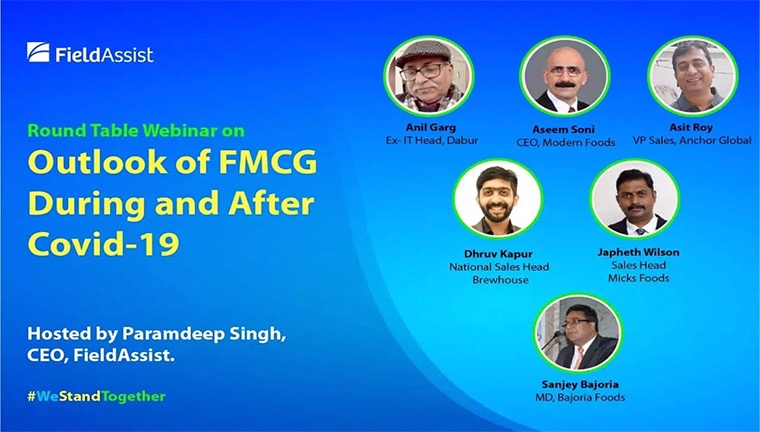Table of Contents
ToggleHope you all are well and taking care of your friends, family and extended community. We are confident that you are taking relevant precautions during COVID -19 as per the government norms. We all know that this is an unprecedented time in all our lives and any industry is evolving and consolidating during this phase. Having said that, FMCG – as an industry- is in an interesting spotlight. Some of the products come under essential items while others are open for transportation with a government license. The local Kirana store is raising its shutter every morning to ensure that India is well fed.
In light of this scenario – we had a roundtable e-discussion with some stalwarts of FMCG to discuss the impact of covid-19 on FMCG Industry. The panelists of the discussion were:
| Sr No. | Name | Company |
| 1 | Mr. Aseem Soni | CEO, Modern Food Enterprises Pvt Ltd. |
| 2 | Mr. Anil Garg | Ex IT Head, Dabur |
| 3 | Mr. Asit Roy | VP Sales, Anchor Global |
| 4 | Mr. Dhruv Kapur | National Sales Head, Brewhouse |
| 5 | Mr. Japheth Wilson | Sales Head, Micks Foods |
| 6 | Mr. Sanjey Bajoria | MD, Bajoria Foods Pvt. Ltd. |
The discussion started with identifying the current problems beyond the ostensible ones and also looked at the probable future post the lockdown. Here are the key takeaways from the session:
1. COVID-19 Retail market is a Guerrilla warfare:
Ideally, the normal retailing norms say that the FMCG salesman does a fixed number of outlets in a day. And now things are very different. Mr. Japheth pointed out that the sales team had no knowledge of the market during the lockdown. Few retailers have opened their shops, few haven’t. In this case, identifying and hitting the right retailer is the key.
2. MOM and POP stores are winning the lockdown battle:
Mr. Sanjey Bajoria, one of the largest importers in the country, has mentioned that Mom and Pop stores or the Kirana stores are winning the battle for their agility. Many retailers are visiting his depots to collect their orders so that they can meet the demands of the customer. Super Markets have not been very agile in reacting to this situation. The retailers are winning the battle by not only keeping the essential commodities but also delivering the supplies to the end consumers within 4-5 km radius. These gestures will bring a strong and long term customer loyalty towards them.

3. Consumers are not brand-conscious:
Mr. Dhruv Kapur pointed out that consumers are not being brand conscious at these times. They are picking up on availability at the retailer’s end. Having said that, he mentioned that if a consumer is able to find the brand of their preference – they are buying it in bulk.

4. Managing internal and external communication is the key:
In this time of mayhem, the central government’s directive can be misinterpreted by the state government and local authorities. Mr. Japeth pointed out instances where local police stopped the vehicle delivering essential supplies. Renowned FMCG consultant mentioned that in this event of crisis managing clear communication with the team is essential. Mr. Aseem Soni mentioned that his teams are in touch with the central government, state government and local authorities to make sure that Modern Foods is able to supply the essential products at the retailer’s end. The Modern team has also used Twitter to escalate the matter and they have received a positive response from the authority on reaching out to the right person.
5. Post lockdown Brands will have to take credit exposure:
In order to survive in the market after the lockdown, brands will have to provide credit to their channels to get the products in the market. Mr. Garg says, “If they do not do it, their competition will eat on to a big chunk of the market. Post-lockdown priority should be to use credit as a tool for product placement.”

6. Work from home will be the new culture:
FMCG as an industry has been a laggard in promoting work from home but currently they have no choice but to increase their efficiency using telephonic and web based interactions. Mr Dhruv mentioned that his Inside Sales Team is working very closely with retailers in this scenario and Brewhouse is getting new ideas how they could be used during and after the lockdown.
Read More: Work From Home During COVID -19 Lockdown
7. Backend Operations are a big hurdle:
Mr. Asit mentioned that the labour supply has stopped and raw materials are scarce. Taking a cue from this point, Mr. Aseem pointed out that packaging material is a huge issue in the current market. Anil Garg recommended true empathy with suppliers and labour force is the only solution that may help in maintaining long term relationships.
8. FMCG Supply Chain will be redefined:
The idea which seems impractical one month back will look seemingly doable. Like for example using retailers to deliver online subscription services or perhaps using the right tool to engage key stakeholders of the supply chain. “The company that deals only with Super Stockist will have to take regular feedbacks from their long arms ie. Distributors and retailers” says Mr. Anil Garg.
The informative session ended with on-ground learning and market analysis pointers. We thank the panelists for taking out their time for this session. One key aspect that resonated in the session was – Brands are working hard to make sure essential supplies are delivered to all of us. For that, constant innovation and tactical methods is necessary.
About Post Author
Nikhil Aggarwal
Driven by his passion for growth through automation, Nikhil takes pride in embarking his clients through a transformational journey and helps them be a more resilient, agile, and future-ready brand.




